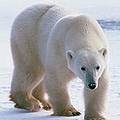 在美國聯邦保育官員決定北極熊是否列入《瀕危物種法》保護名單之前,重要的北極熊棲應該先限制開採石油或是天然氣。美國眾議院能源獨立暨全球暖化委員會主席17日如此表示。
在美國聯邦保育官員決定北極熊是否列入《瀕危物種法》保護名單之前,重要的北極熊棲應該先限制開採石油或是天然氣。美國眾議院能源獨立暨全球暖化委員會主席17日如此表示。
「順序是很重要的」委員會主席馬凱(Ed Markey),同時也是麻州的民主黨議員表示,「你不會先穿鞋再穿襪,就像我們不應該先賣出這些重要北極熊棲地的開採權,再來決定要怎麼保護他們。」
馬凱召集了一個公聽會,針對美國魚類及野生物管理局(USFWS)在1月7日所宣布的消息:關於北極熊是否列入《瀕危物種法》「受威脅」等級,該局尚無定論,延後再議──這樣的延宕,很可能會拖到美國礦業管理局出售阿拉斯加處克其海(Chukchi Sea)的石油和天然氣租賃權之後,這個地區共有約2,000隻北極熊居住在此。
這個事件變得敏感是因為,如果北極熊被列為瀕臨絕種動物,開放該區域的開採權將會面臨更嚴格的環境影響評估程序。 「這兩個決策的時間點讓大石油公司有門路可以在北極熊列入瀕危物種法保護名單之前,獲得北極熊棲地的開採權」馬凱表示。
去年秋天由美國地理調查局公布的研究顯示,因為上升的氣溫造成的冰層融化,世界上2/3的北極熊將會在2050年之前消失,加處克其海也包含在此估計當中,而其北極熊數量是全美的一半。
考慮到全球暖化對於北極熊的影響,美國魚類及野生物管理局2007年即考慮將其列入名單之中,原訂於1月9日宣布結果,但是現在他們表示他們需要多幾個星期的時間來重新審查資料。
Key polar bear habitat should be held off limits to oil and gas drilling until federal wildlife officials have determined whether the species should be listed for protection under the Endangered Species Act, the chair of the House Select Committee on Energy Independence and Global Warming said today.
"Order matters," said committee chair Ed Markey a Massachusetts Democrat. "You don't put on your shoes before your socks … and we shouldn't be selling the drilling rights in this important polar bear habitat before deciding how we are going to protect them."
Markey convened the hearing in the wake of an announcement on January 7 by the U.S. Fish and Wildlife Service that it will delay a decision on whether the polar bear should be listed as "threatened" under the Endangered Species Act.
The delay makes it likely the decision on listing will come after the U.S. Minerals Management Service sells oil and gas leases in Alaska’s Chukchi Sea, inhabited by some 2,000 polar bears.
That is controversial because the plan to open the area to drilling would face greater environmental scrutiny if the polar bear was on the endangered species list.
"The timing of these two decisions leaves the door open for the administration to give Big Oil the rights to this polar bear habitat the moment before the protections for the polar bear under the Endangered Species Act go into effect," Markey said.
A study issued last fall by the U.S. Geological Survey found that two-thirds of the world’s polar bears could disappear by 2050 due to increased sea ice melt caused by rising temperatures. The Chukchi Sea population, which makes up about half the U.S. polar bear population, is included in that estimate.
Concern about the impact of global warming on polar bears prompted the Fish and Wildlife Service last year to consider listing the species. The agency was scheduled to announce its decision on January 9 but instead said it needed a few more weeks to review information on the species.






